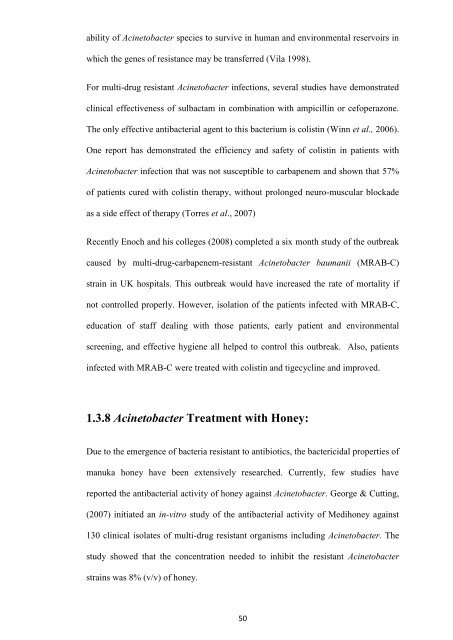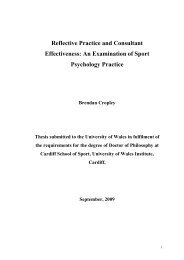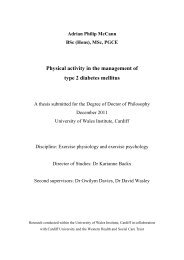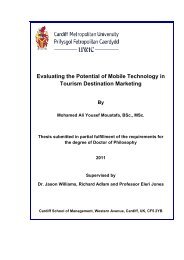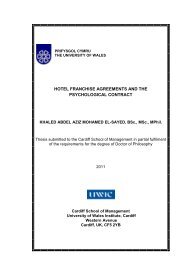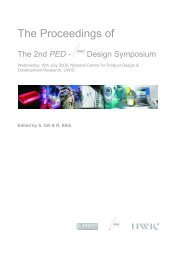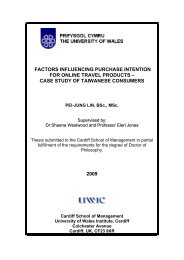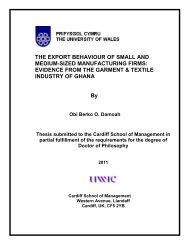- Page 1 and 2: Honey as an antimicrobial agent aga
- Page 3 and 4: 1.2.3 Emergence of ESBL: 9 1.2.4 Ri
- Page 5 and 6: 2.2.1 Honey sample collection: 51 2
- Page 7 and 8: 2.5 Effect of honey on bacterial st
- Page 9 and 10: viable count 3.4.2.1 Acinetobacter
- Page 11 and 12: Declaration This work has not previ
- Page 13 and 14: Acknowledgments I wish to express m
- Page 15 and 16: Index of Tables Tables Title Page T
- Page 17 and 18: Index of Tables (Continued) Tables
- Page 19 and 20: Index of Figures Figure Title Page
- Page 21 and 22: Index of Figures (Continued) Figure
- Page 23 and 24: Index of Figures (Continued) Figure
- Page 25 and 26: Index of Figures (Continued) Figure
- Page 27 and 28: ESBL- Extended spectrum beta lactam
- Page 29 and 30: TEM- Temoneira UTI- Urinary tract i
- Page 31 and 32: Chapter 1 Introduction 31
- Page 33 and 34: such as methicillin resistant Staph
- Page 35 and 36: Beta-lactamases in this classificat
- Page 37 and 38: cefotaxime faster than ceftazidime;
- Page 39 and 40: 1.2.3 Emergence of ESBL: The produc
- Page 41 and 42: Acinetobacter spp are widespread in
- Page 43 and 44: many secretions of normal people an
- Page 45 and 46: 1.3.4.1 The production of exopolysa
- Page 47 and 48: 1.3.5 Emergence of Resistance: A.ba
- Page 49: In the last few years resistant str
- Page 53 and 54: Gideonsen 2005), malignant ulcers (
- Page 55 and 56: Nezeako & Hamdi, (2000) tested six
- Page 57 and 58: In addition, honey contains several
- Page 59 and 60: with the help of an enzyme (glucose
- Page 61 and 62: (Wahdan 1998), and vanillic acid, c
- Page 63 and 64: Table 1.2: Comparisons between pero
- Page 65 and 66: Another study compared the effectiv
- Page 67 and 68: of raw honey samples from Acacia, h
- Page 69 and 70: 1.5 Aims and Objectives: The aim of
- Page 71 and 72: The materials used throughout this
- Page 73 and 74: Table 2.3: Chemicals and Reagents u
- Page 75 and 76: Table 2.5: Equipment used in electr
- Page 77 and 78: Fifty five clinical isolates belong
- Page 79 and 80: 2.1 Characterization of test organi
- Page 81 and 82: 2.2 Characterization of honey sampl
- Page 83 and 84: transfered into a large square assa
- Page 85 and 86: 2.2.3 Determination of pH: This met
- Page 87 and 88: once the tubing opened at one end a
- Page 89 and 90: was re-suspended in 1 ml liquefied
- Page 91 and 92: difference between this absorbance
- Page 93 and 94: and Omani honey (B) with hydrogen p
- Page 95 and 96: 2.3.1.2 Broth dilution method: 2.3.
- Page 97 and 98: 2.4 Time Kill Curve Assay: 2.4.1 St
- Page 99 and 100: 2.5.1.2 Preparation of cells in the
- Page 101 and 102:
2.5.2.2 Preparation of cells for tr
- Page 103 and 104:
Table 2.14: Reagents and buffers us
- Page 105 and 106:
samples (Fig 2.3). Each sample was
- Page 107 and 108:
tray was covered and wrapped in sar
- Page 109 and 110:
Chapter 3 Results 109
- Page 111 and 112:
Table 3.1a: Identification and anti
- Page 113 and 114:
Table 3.2: Confirmation of identity
- Page 115 and 116:
Table 3.4: Confirmation of identity
- Page 117 and 118:
Table 3.6: Confirmation of identity
- Page 119 and 120:
The diameter of the zones of inhibi
- Page 121 and 122:
Table 3.7: Antibacterial activity o
- Page 123 and 124:
with visual estimation. The colour
- Page 125 and 126:
Figure 3.3: Image of pollen present
- Page 127 and 128:
3.3 Determination of antibacterial
- Page 129 and 130:
3.3.1.2 Broth dilution method: The
- Page 131 and 132:
The MIC range of 30 Acinetobacter i
- Page 133 and 134:
Mean MIC and MBC (%w/v) values of m
- Page 135 and 136:
Table 3.15: Susceptibility of 15 En
- Page 137 and 138:
3.3.2 Sensitivity of MDR and ESBLs
- Page 139 and 140:
Table 3.18: Susceptibility of 11 Kl
- Page 141 and 142:
Table 3.20: Susceptibility of 15 En
- Page 143 and 144:
Table 3.22: Susceptibility of 8 Ser
- Page 145 and 146:
3.4 Time Kill Curves One representa
- Page 147 and 148:
Figure 3.6: The effect of manuka ho
- Page 149 and 150:
3.4.2 Inhibition of test organisms
- Page 151 and 152:
This data was done in triplicate Nu
- Page 153 and 154:
This data was done in triplicate Fi
- Page 155 and 156:
This data was done in triplicate Fi
- Page 157 and 158:
This data was done in triplicate Fi
- Page 159 and 160:
This data was done in triplicate Fi
- Page 161 and 162:
Figure 3.15: The effect of manuka h
- Page 163 and 164:
All isolates showed statistically s
- Page 165 and 166:
Figure 3.16: Growth curve of Acinet
- Page 167 and 168:
Figure 3.20: Growth curve of Citrob
- Page 169 and 170:
(Table 3.26). The length of individ
- Page 171 and 172:
Figure 3.24: SEM micrograph of untr
- Page 173 and 174:
Figure 3.28: SEM micrographs of unt
- Page 175 and 176:
C D Cell division Multiple septa in
- Page 177 and 178:
Figure 3.31: SEM micrographs of Aci
- Page 179 and 180:
Figure 3.32: SEM micrograph of untr
- Page 181 and 182:
3.5.2.3 SEM of Klebsiella Klebsiell
- Page 183 and 184:
Figure 3.37: SEM micrographs of unt
- Page 185 and 186:
Figure 3.39: SEM micrographs of Kle
- Page 187 and 188:
Figure 3.40: SEM micrographs of Kle
- Page 189 and 190:
C D 189
- Page 191 and 192:
Figure 3.42: SEM micrographs of unt
- Page 193 and 194:
Figure 3.44: SEM micrographs of unt
- Page 195 and 196:
3.5.2.5 SEM of Citrobacter For Citr
- Page 197 and 198:
Figure 3.47: SEM micrographs of Cit
- Page 199 and 200:
Figure 3.49: SEM micrographs of Cit
- Page 201 and 202:
Figure 3.50: SEM micrograph of untr
- Page 203 and 204:
Table 3.26: Comparison of changes i
- Page 205 and 206:
Figure 3.54: Transmission micrograp
- Page 207 and 208:
Figure 3.56: Transmission micrograp
- Page 209 and 210:
3.5.2.2. TEM for E.coli: TEM images
- Page 211 and 212:
Figure 3.59: Transmission micrograp
- Page 213 and 214:
Figure 3.61: Transmission micrograp
- Page 215 and 216:
Figure 3.62: 2-D protein electropho
- Page 217 and 218:
“The therapeutic potential of unc
- Page 219 and 220:
Non-peroxide honey shown to be effe
- Page 221 and 222:
Sugars are the major content of hon
- Page 223 and 224:
Acacia (thorn trees), Myrtacae euca
- Page 225 and 226:
major wound pathogens, consistently
- Page 227 and 228:
MIC % (w/v) Previous studies MIC %
- Page 229 and 230:
Figure 4.3: Mean MIC and MBC (%w/v)
- Page 231 and 232:
4.4 Inhibition of test organisms by
- Page 233 and 234:
honey chemistry. Nevertheless, obse
- Page 235 and 236:
In TEM, the cell membrane was inter
- Page 237 and 238:
with more than (3-log10 reduction).
- Page 239 and 240:
To date there is little research on
- Page 241 and 242:
The effect of defensin peptide was
- Page 243 and 244:
4.6 Further investigations: There i
- Page 245 and 246:
Chapter 5 References 245
- Page 247 and 248:
� Al-Jabri, A. A., Nzeako, B. C.,
- Page 249 and 250:
� Bang, L. M., Buntting, C. and M
- Page 251 and 252:
� Bou, G., Oliver, A. and Martine
- Page 253 and 254:
� Cooper, R. (2005) The Antimicro
- Page 255 and 256:
� Efem, S. E., Udoh, K. T. and Iw
- Page 257 and 258:
� Greenwood, D., Finch, P., Davey
- Page 259 and 260:
� Kagan, B.L., Ganz, T. and Lehre
- Page 261 and 262:
esistant Staphylococcus aureus (CA-
- Page 263 and 264:
� Murray, P. R., Baron, E. J., Jo
- Page 265 and 266:
� Scholar, E. M. and Pratt, W. B.
- Page 267 and 268:
� Subrahmanyam, M. (1998) A prosp
- Page 269 and 270:
� Wadi, M., Al-Amin, H., Farouq,


